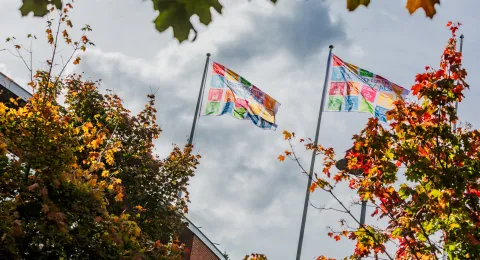LUT University’s campuses are in Lappeenranta and Lahti, Finland. The campus buildings and the land they are on are owned in Lappeenranta by the University Properties of Finland (Suomen Yliopistokiinteistöt Oy, SYK) and in Lahti by Isku Center. In addition, LUT has regional units in Kouvola and Mikkeli.
Green campus in Lappeenranta
On the Lappeenranta campus, the buildings have been constructed in accordance with the BREEAM standards (see the BREEAM Assessments database for further information). We take actions according to our Climate Action Plan and use continuous monitoring to achieve higher energy efficiency on the campus.
Improving energy efficiency
Annual energy audit is conducted to identify areas with energy saving potential and to plan energy efficiency upgrades. For example, an investment in LED lights for the library reduced electricity consumption. Facilities are used more efficiently, and adjustments have been made to avoid wasting electricity, heat or water, and to maintain good indoor air quality. Irregularities are identified quickly thanks to smart building management technology. Waste heat is recycled with a hybrid heat pump for heating and cooling. The campus also houses batteries that help balance fluctuations in electricity demand. In July 2022, the campus switched to certified bio-based district heating.
Waste management and recycling
Campus waste management aims to raise the recycling rate and reduce food waste in campus restaurants. Kampusravintolat in Lappeenranta has taken active measures to reduce biowaste and promote its sorting. The sorting of plastic waste started in early 2023. The university has increased waste sorting containers and pays greater attention to their timely emptying to increase the efficiency of waste management and recycling. Read instructions
Promoting biodiversity
The ecosystem values of the Lappeenranta campus have been surveyed by a suitably qualified ecologist. The campus is an ecologically noteworthy site that serves as a habitat for a wide range of organisms. The preservation of elements that increase biodiversity is taken into consideration in the planning and maintenance of the area.
Biodiversity has been increased by turning some of the lawn and asphalt areas into meadows and by adding diverse perennials, shrubs, and trees. Plant choices favour native species that tolerate drought and support pollinators. Flowering plants provide food and habitats throughout the growing season.
The wide variety of plants improves the area’s adaptability to changing weather conditions. The front yard was renovated in 2025. The paved area was reduced by replacing it with permeable rock dust and meadow areas that cut down on stormwater runoff into the city's drainage system. Storm sewage management was also improved by channelling rainwater into green spaces and low-lying areas where it can collect and soak into the soil.
More about SYK
- SYK is an expert organisation owned jointly by the government and universities. It owns and develops campuses.
- SYK has defined its own responsibility policy, which supports LUT's pursuit of carbon neutrality.
- SYK also offsets its carbon emissions annually by purchasing carbon credits voluntarily in a carbon market.
- SYK is committed to the energy efficiency objectives set in the Energy Efficiency Agreements of the property sector.
- Find out more about SYK's work for sustainable development and read its sustainability report.
Energy-savvy Isku Center in Lahti
In Lahti, LUT and LAB rent facilities from Isku Center, where smart energy solutions based on efficient geothermal pumps both heat and cool the building. On the coldest days of the year, also district heating is used. The solar photovoltaic panels on the roof are used for purposes such as cooling and the charging of electric cars.
More about Isku Center
- Isku Center is an ecological, adaptive business hub in Mukkula, Lahti.
- The building's energy system has been overhauled, resulting in energy economy, good indoor air quality and a small carbon footprint.
- LUT Universities rent roughly 24 000 m2.
How we save and protect water on campus
Read more about the use and protection of water on campus, and how LUT contributes to water treatment, conservation and sustainable water technologies by research, education and collaboration.
More information

Campus addresses and maps


